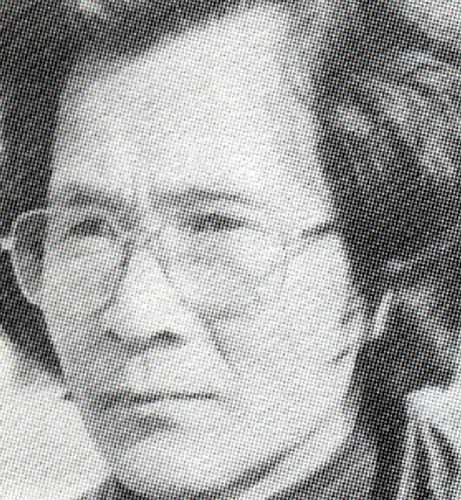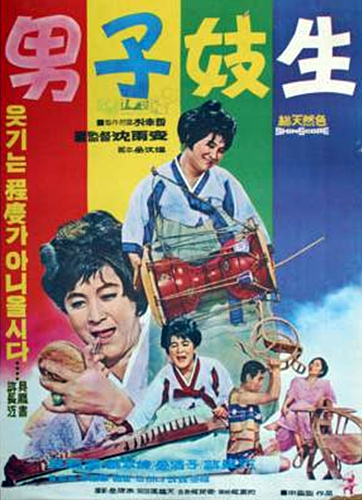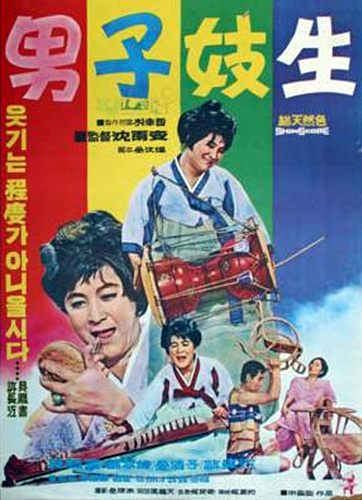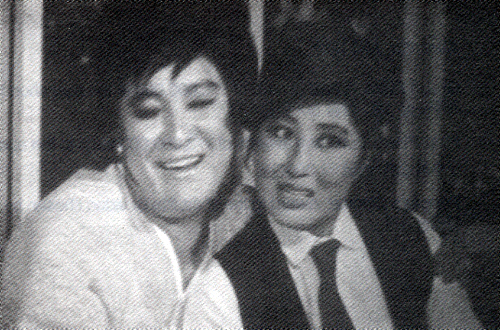3rd(2001)
Man and Gisaeng
Shim Wu-Seob
- Korea
- 1969
- 85min
- 35mm
- color
SYNOPSIS
Man and Gisaeng is one of the representative Sixties director Shim Wu-Seob’s transvestite comedies and ‘male series’ like A Male Housekeeper(1968) and The Male Beauty Artist(1968). This film is about Koo Bong-Seo, a man who gets fired for enjoying ‘feminine actions’ by making some money on the side by washing his colleagues’s socks and stockings for 10 won a pair, and then, not being able to find work, decides after great anguish and consideration to become a ‘gisaeng’, acting out his femininity at a restaurant wearing ‘hanbok’ and eventually monopolizing the men’s affections.
Through the image of a man who has changed his gender role by changing into women’s clothes, Man and Gisaeng explicitly shows that ‘femininity’ is not fundamental, but that it is constructed in a system that recreates and states ‘what is feminine’ and that this is acted out through citation and repetition. This film, which doubles audiences over with laughter from beginning to end gives us an opportunity to examine the conflict between traditional and modern values and gender roles; and the dynamic relationship between modernization and gender-specific divisions of labor. (Kwon Eun-Sun)
Through the image of a man who has changed his gender role by changing into women’s clothes, Man and Gisaeng explicitly shows that ‘femininity’ is not fundamental, but that it is constructed in a system that recreates and states ‘what is feminine’ and that this is acted out through citation and repetition. This film, which doubles audiences over with laughter from beginning to end gives us an opportunity to examine the conflict between traditional and modern values and gender roles; and the dynamic relationship between modernization and gender-specific divisions of labor. (Kwon Eun-Sun)
PROGRAM NOTE
Man and Gisaeng is one of the representative Sixties director Shim Wu-Seob’s transvestite comedies and ‘male series’ like A Male Housekeeper(1968) and The Male Beauty Artist(1968). This film is about Koo Bong-Seo, a man who gets fired for enjoying ‘feminine actions’ by making some money on the side by washing his colleagues’s socks and stockings for 10 won a pair, and then, not being able to find work, decides after great anguish and consideration to become a ‘gisaeng’, acting out his femininity at a restaurant wearing ‘hanbok’ and eventually monopolizing the men’s affections.
Through the image of a man who has changed his gender role by changing into women’s clothes, Man and Gisaeng explicitly shows that ‘femininity’ is not fundamental, but that it is constructed in a system that recreates and states ‘what is feminine’ and that this is acted out through citation and repetition. This film, which doubles audiences over with laughter from beginning to end gives us an opportunity to examine the conflict between traditional and modern values and gender roles; and the dynamic relationship between modernization and gender-specific divisions of labor. (Kwon Eun-Sun)
Through the image of a man who has changed his gender role by changing into women’s clothes, Man and Gisaeng explicitly shows that ‘femininity’ is not fundamental, but that it is constructed in a system that recreates and states ‘what is feminine’ and that this is acted out through citation and repetition. This film, which doubles audiences over with laughter from beginning to end gives us an opportunity to examine the conflict between traditional and modern values and gender roles; and the dynamic relationship between modernization and gender-specific divisions of labor. (Kwon Eun-Sun)
Director
-

Shim Wu-SeobShim Wu-Seob
Born in 1933, Shim Wu-Seob mainly directed comedy genre films. His films were appreciated for catering to working class’ sensibility, while being criticized for slanting towards excessive commercialism. He played a great role in helping the comedy genre become one of the most popular genres in the history of Korean cinema. His works include A Male Housekeeper (1968), Success(1969), I Don’t Want to Be a Woman(1981).
Credit
- ProducerShin Sang-Okk 신상옥
- Cast Koo Bong-Seo 구봉서, Do Keum-Bong 도금봉, Kim Che
- Screenwriter Kim Mun-Yeob 김문엽
- Cinematography Kim Jong-Rae 김종래
- Art director Jeong Wu-Taek 정우택
- Editor Oh Seong-Hwan 오성환
- Music Jeong Min-Seob 정민섭
- Sound Kim Kyeong-Il 김경일




